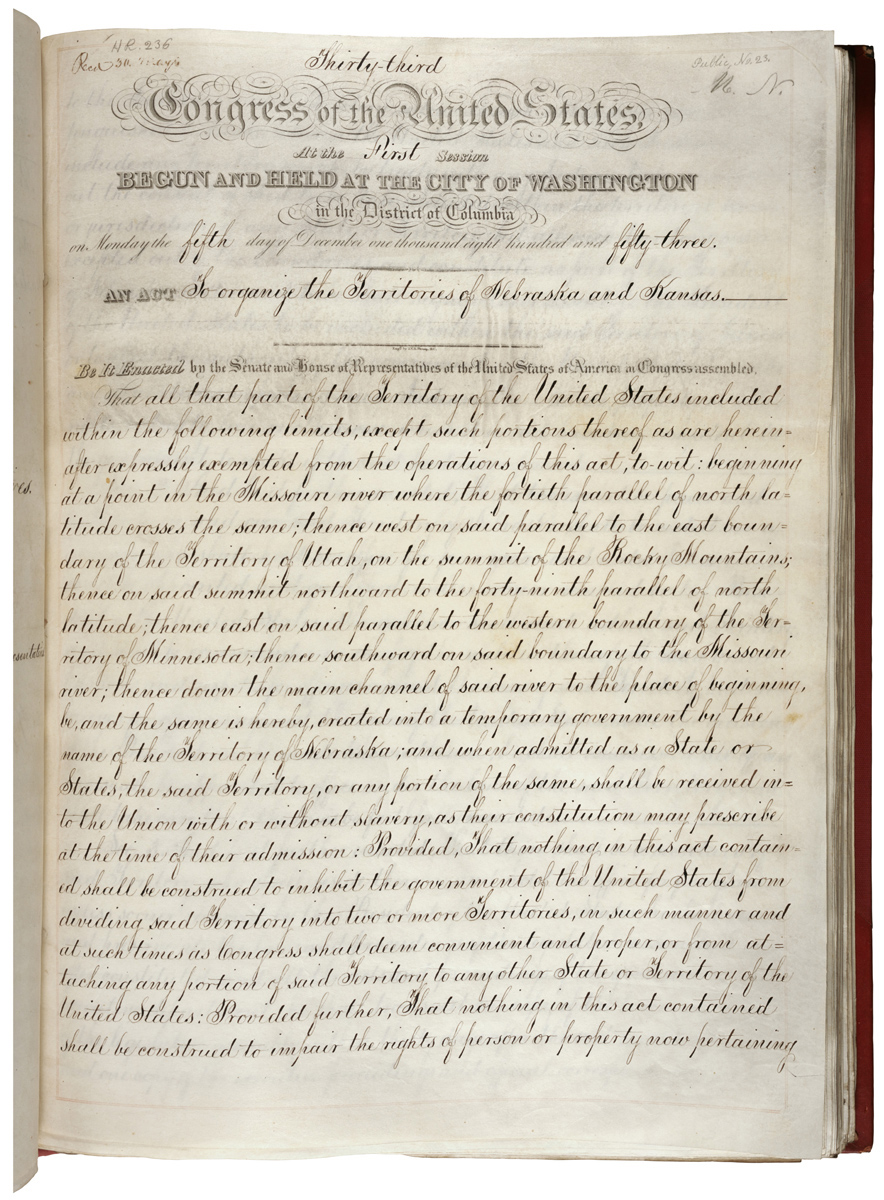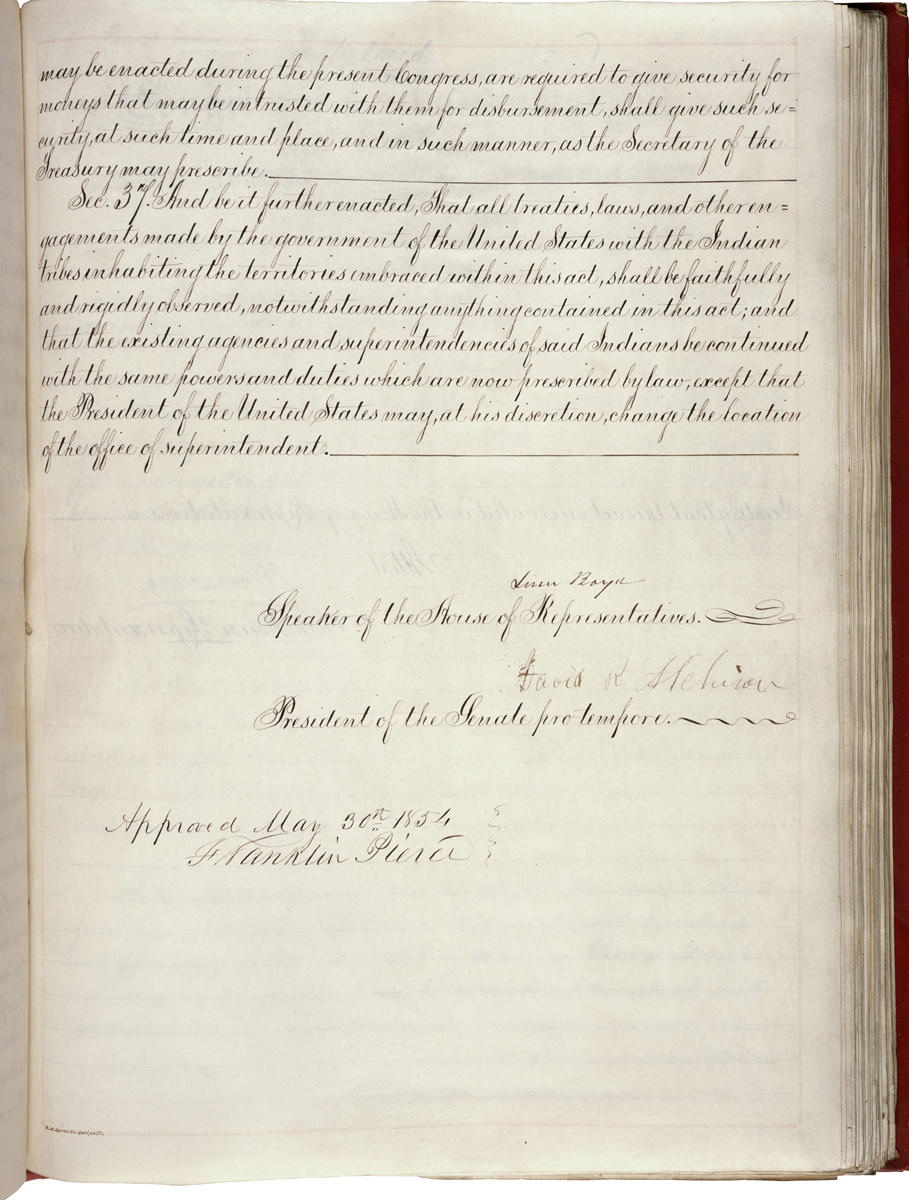“An Act to Organize the Territories of Nebraska and Kansas,” May 30, 1854
For many years, Congress had tried to “organize,” meaning provide a government for, the northern part of the Louisiana Purchase. Because slavery was prohibited there by the Missouri Compromise of 1820, legislation to organize the territory failed. Southern congressmen had no interest in creating new free territories that would then become free states and increase the power of the North in Congress and the electoral college.
In early 1854, Senator Stephen A. Douglas, chairman of the Senate Committee on Territories, introduced a new bill, the Kansas-Nebraska Act, to organize the northern part of the Louisiana Purchase. (Although Nebraska was listed first and the first eighteen sections of the bill cover the organization of Nebraska Territory, it became popularly known as the Kansas-Nebraska Act because of the turmoil in Kansas Territory.) The bill was revised to include an explicit repeal of the Missouri Compromise’s prohibition of slavery. After stormy debate in Congress, the legislation passed on May 30, 1854.
The Kansas-Nebraska Act has been considered one of the most important documents in U.S. history. It’s important to remember that a piece of legislation such as the Kansas-Nebraska Act reflected a long debate, not just in the halls of Congress, but in the newspapers and public opinion, about how territories should be governed and whether they should have slavery. When you read the bill, think about the different opinions people may have had on those issues and how the legislation came to reflect those opinions. You can view the original document here.


An Act to Organize the Territories of Nebraska and Kansas
May 30, 1854
Be it enacted by the Senate and House of Representatives of the United States of America in Congress assembled . . .
SEC. 19. And be it further enacted, That all that part of the Territory of the United States included within the following limits . . . beginning at a point on the western boundary of the State of Missouri . . . and the same is hereby, created into a temporary government by the name of the Territory of Kansas; and when admitted as a State or States, the said Territory, or any portion of the same, shall be received into the Union with or without slavery, as their Constitution may prescribe at the time of their admission. . . .
SEC. 20. And be it further enacted, That the executive power and authority in and over said Territory of Kansas shall be vested in a Governor, who shall hold his office for four years, and until his successor shall be appointed and qualified, unless sooner removed by the President of the United States. The Governor shall reside within said Territory, and shall be commander-in-chief of the militia thereof. . . .
SEC. 22. And be it further enacted, That the legislative power and authority of said Territory shall be vested in the Governor and a Legislative Assembly. . . . An apportionment shall be made, as nearly equal as practicable, among the several counties or districts, for the election of the Council and Representatives, giving to each section of the Territory representation in the ratio of its qualified voters as nearly as may be. And the members of the Council and of the House of Representatives shall reside in, and be inhabitants of, the district or county, or counties, for which they may be elected, respectively. Previous to the first election, the Governor shall cause a census, or enumeration of the inhabitants and qualified voters of the several counties and districts of the Territory, to be taken. . . . And the first election shall be held at such time and places, and be conducted in such manner, both as to the persons who shall superintend such election and the returns thereof, as the Governor shall appoint and direct. . . . The persons having the highest number of legal votes in each of said Council Districts for members of the Council, shall be declared by the Governor to be duly elected to the Council; and the persons having the highest number of legal votes for the House of Representatives, shall be declared by the Governor to be duly elected members of said house. . . .
SEC. 23. And be it further enacted, That every free white male inhabitant above the age of twenty-one years, who shall be an actual resident of said Territory, and shall possess the qualifications hereinafter prescribed, shall be entitled to vote at the first election, and shall be eligible to any office within the said Territory. . . .
SEC. 28. And be it further enacted, That the provisions of the act entitled “An act respecting fugitives from justice, and persons escaping from the service of their masters,” approved February twelfth, seventeen hundred and ninety-three, and the provisions of the act entitled “An act to amend, and supplementary to, the aforesaid act,” approved September eighteenth, eighteen hundred and fifty, be, and the same are hereby, declared to extend to andbe in full force within the limits of the said Territory of Kansas. . . .
SEC. 32. And be it further enacted … That the Constitution, and all laws of the United States which are not locally inapplicable, shall have the same force and effect within the said Territory of Kansas as elsewhere within the United States, except the eighth section of the act preparatory to the admission of Missouri into the Union, approved March sixth, eighteen hundred and twenty, which, being inconsistent with the principle of non-intervention by Congress with slavery in the States and Territories, as recognized by the legislation of eighteen hundred and fifty, commonly called the Compromise Measures, is hereby declared inoperative and void; it being the true intent and meaning of this act not to legislate slavery into any Territory or State, nor to exclude it therefrom, but to leave the people thereof perfectly free to form and regulate their domestic institutions in their own way, subject only to the Constitution of the United States. . . .
Source: Our Documents, accessed February 27, 2014, www.ourdocuments.gov.
Questions
Question
7CcLBptC9Gzbvy3fwdG0BNmySslW/pMH8LjjHK/NPbx/O5uFh4jRbWWOZqTJztTDmicvohmnL5nfjO/sDkFU+VY01ZXzY5ys2TyNLA==Question
Ez/emFwYN1tNs3lKxVSJJUqYwxsumYgZ4rGK5UtR5MomhbdAGXDF2WweAvMn0g2kjiYNIKoYJjwCKOE/Question
Kw1L4BuXYXCewh2zXoPyF435XG4AzNT9JSkMmZo9CHbIxGOMk93HMXR4sqDFAdbwvxnfH4kW+6XKKX/EoEW3TyfmwWY=